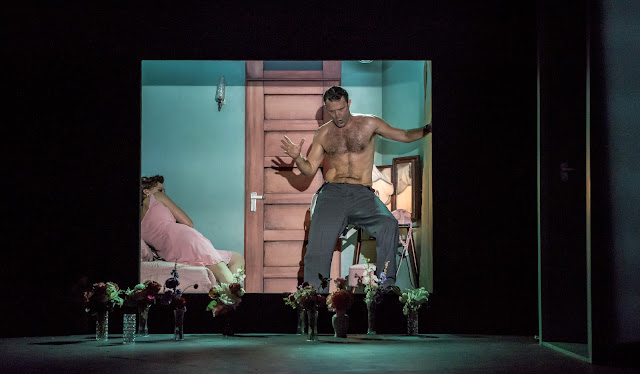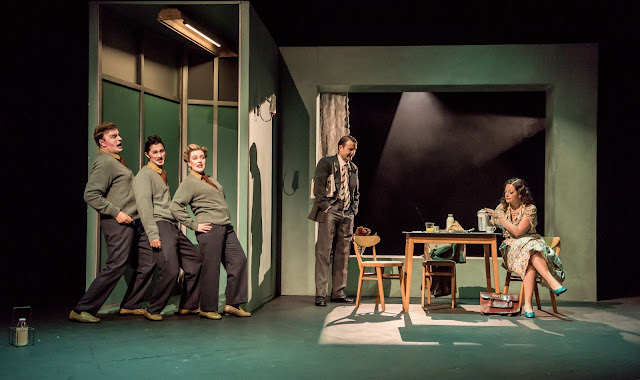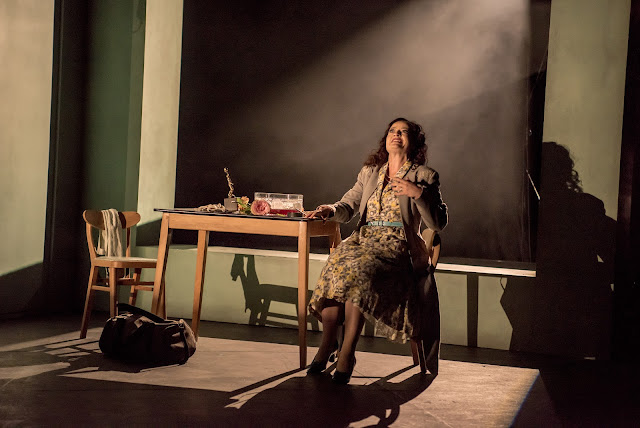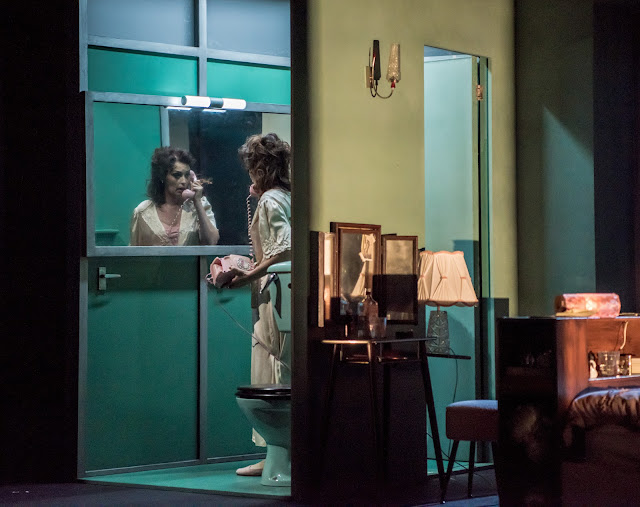 |
| Bernstein: Trouble in Tahiti – Charles Rice, Allison Cooke – Buxton International Festival (Photo: Genevieve Girling) |
Leonard Bernstein: Trouble in Tahiti, Francis Poulenc: La voix humaine; Hanna Hipp, Charles Rice, Allison Cooke, Chloé Hare-Jones, Harun Tekin, Ross Cumming, director: Daisy Evans, conductor: Iwan Davies; Buxton International Festival at Buxton Opera House
Reviewed 19 July 2025
Two operas from the 1950s in a clever double bill that does not quite work as a pairing but features some strong individual performances
Both were written in the 1950s and both deal with dissatisfaction with modern life and relationships, yet Leonard Bernstein’s Trouble in Tahiti, and Francis Poulenc’s La voix humaine would seem to inhabit different worlds. Trouble in Tahiti, which had a troubled debut in 1952 and remains forever linked with Bernstein’s later sequel, A quiet place, is imbued with jazz and the failure of the American dream. La voix humaine, which debuted in 1959, was written for (and perhaps partly created by) the great singing actress Denise Duval, yet has an aura of Paris of the 1930s when Jean Cocteau’s play, on which the opera is based, made its debut.
Buxton International Festival, in collaboration with Norwich Theatre, made the brave decision to create a double bill from these two. Directed by Daisy Evans and conducted by Iwan Davies, the production also featured the debut of the Festival Orchestra. We caught the performance at Buxton Opera House on Saturday 19 July with Charles Rice and Hanna Hipp as Sam and Dinah, plus Chloé Hare-Jones, Harun Tekin and Ross Cumming (all three from the BIF Chorus) as the vocal trio, and Allison Cooke as Elle. Designs were by Loren Elstein, lighting by Jake Wiltshire.
 |
| Bernstein: Trouble in Tahiti – Ross Cumming, Harun Tekin, Chloé Hare-Jones, Charles Rice, Hanna Hipp – Buxton International Festival (Photo: Genevieve Girling) |
Loren Elstein’s bleak but stylish set caught the essential ennui of Sam and Dinah’s (Charles Rice and Hanna Hipp) marriage, and this must be one of the bleakest accounts of Trouble in Tahiti that I have seen. The trio (Chloé Hare-Jones, Harun Tekin and Ross Cumming) were almost modern Commedia dell’Arte figures, highly involved in Sam and Dinah’s lives, and playing the other silent figures that Bernstein included in the libretto.
Daisy Evans did not let the jazzier moments lighten the atmosphere, instead they formed ironic, almost savage, commentaries on the disintegration of both the marriage and the American Dream. Hints of how the two operas were linked in this production came from the window onto Sam and Dinah’s house where a woman (Allison Cooke) put on make up and elegantly waited, having a silent relationship with Charles Rice’s Sam. Then during his disquisition on what it is to be a main, usually present in the gym, he and the woman had an intimate encounter, at times erotic (a very 1950s removing of a stocking) and at times violent.
Charles Rice and Hanna Hipp gave devastating, almost savage performances as Sam and Dinah, with Rice revealing an underling level of violence and Hipp a terrible desperation.
 |
| Bernstein: Trouble in Tahiti – Hanna Hipp – Buxton International Festival (Photo: Genevieve Girling) |
After the interval, despite the change in language and continent, we were in the room of the neighbouring woman, Elle (Allison Cooke), with a view into Sam and Dinah’s house. Evans had worked hard to integrate the two storylines. The three vocalists (Chloé Hare-Jones, Harun Tekin and Ross Cumming) , though now silent, were highly involved in Elle’s life, Pierrot-like at times. The unknown man on the end of the telephone was, of course Sam (Charles Rice) and many of the interruptions that are a natural part of Poulenc’s score involved Rice’s Sam and Hipp’s Dinah and their arguments. It was cleverly done. By the end of the opera, Allison Cooke’s Elle was no longer on the phone and her final words were written as a suicide note.
It was intriguing and poignant, but the interventions felt just that bit too clever, and seemed to take the focus away from Cooke’s performance. She presented a powerful Elle, yet this is an opera as much about words as music. After all, Poulenc cut little of Cocteau’s play. Cooke’s French was rather occluded and unlike Trouble in Tahiti, here we needed the subtitles. Also some of Cooke’s French vowels felt distorted. Overall, it seemed as if she was prioritising music over text, which is the wrong way round in this opera.
 |
| Francis Poulenc: La voix humaine – Allison Cooke – Buxton International Festival (Photo: Genevieve Girling) |
In the pit, the orchestra under Iwan Davies’ deft direction did full justice to these two contrasting scores. At a time when companies are using economies of scale to present La voix humaine in a version with piano (which Poulenc hated), it was heartening to hear the full version.
This was an interesting and thought-provoking experiment. Having seen Daisy Evans’ production of Trouble in Tahiti, what I would really love is for someone to invite her back to complete the double bill and give us Bernstein’s later one-act version of A quiet place as a companion.
The blog is free, but I’d be delighted if you were to show your appreciation by buying me a coffee.
Elsewhere on this blog
- Old-fashioned drama & a modern gloss: Cecilia Stinton directs Donizetti’s Lucia di Lammermoor at Opera Holland Park with Jennifer France – review
- A family affair: from a memorial to his father, Andrew Arceci’s Winchendon Music Festival has grown into a community enterprise – interview
- Who are these people? Oliver Mears’ heavy handed updating of Handel’s Semele at Covent Garden fails to convince – opera review
- The Barber in Benidorm: Louise Bakker’s 1970s sitcom take on Rossini’s Il barbiere di Siviglia with a terrific cast at Longborough – opera review
- New music to the fore: Gergely Madaras & BBC NOW celebrate Cheltenham Music Festival’s 80th birthday in rousing style – concert review
- Spurred on by the story-telling: conductor Peter Whelan on bringing the Dublin version of Handel’s Alexander’s Feast to life with the Irish Baroque Orchestra – interview
- A moving immediacy and directness: British Youth Opera in Britten’s Peter Grimes with Mark Le Brocq in the title role – opera review
- We were transported: local history and engaging performances in Donizetti’s L’elisir d’amore at St Paul’s Opera – opera review
- A game changer: as RPS Conductors programme enters a new phase, I chat to founder Alice Farnham & an early participant, Charlotte Corderoy – interview
- A quartet of concerts ended a marvellous, fulfilling and enjoyable Aldeburgh Festival – concert review
- Home


%20and%20Hanna%20Hipp%20(Dinah)%20Credit_%20Genevieve%20Girling%20(4).jpg?w=998&resize=998,665&ssl=1)






